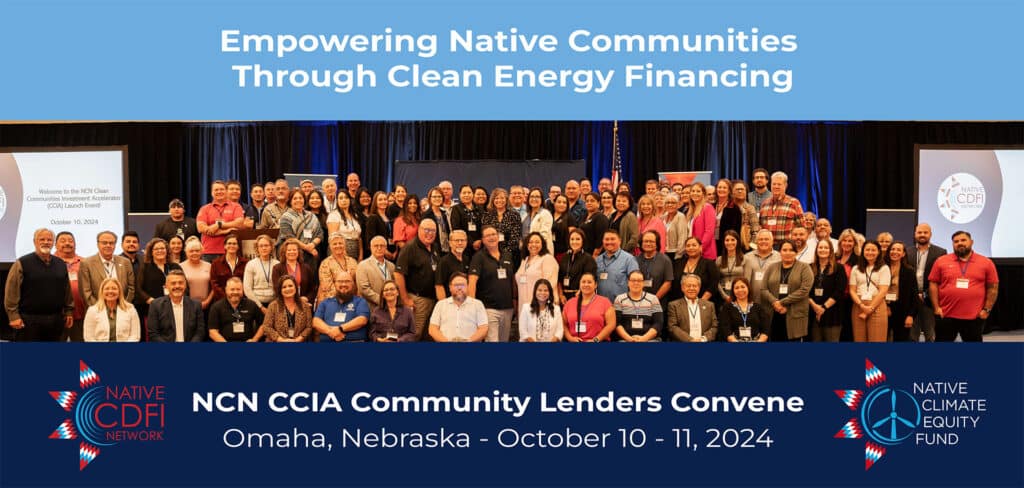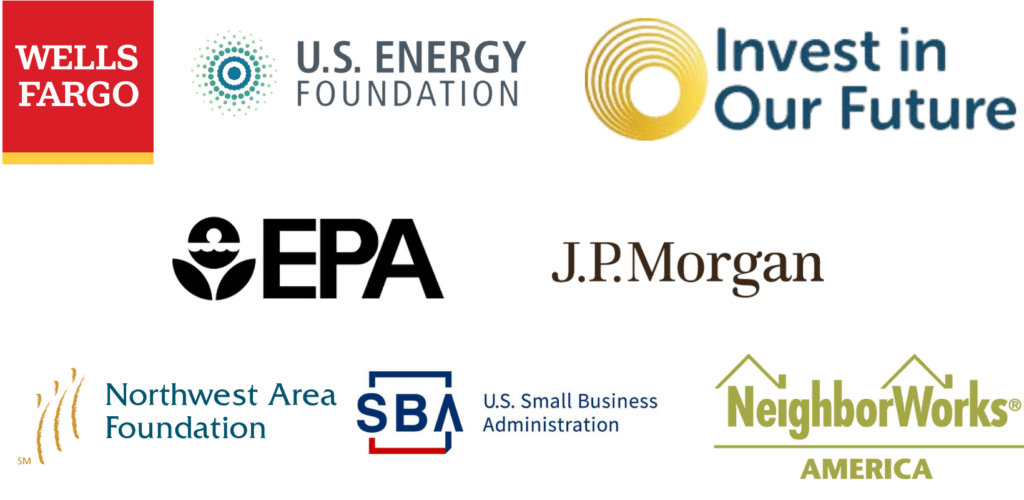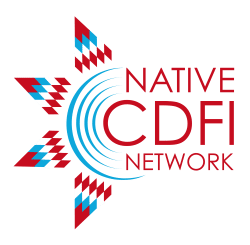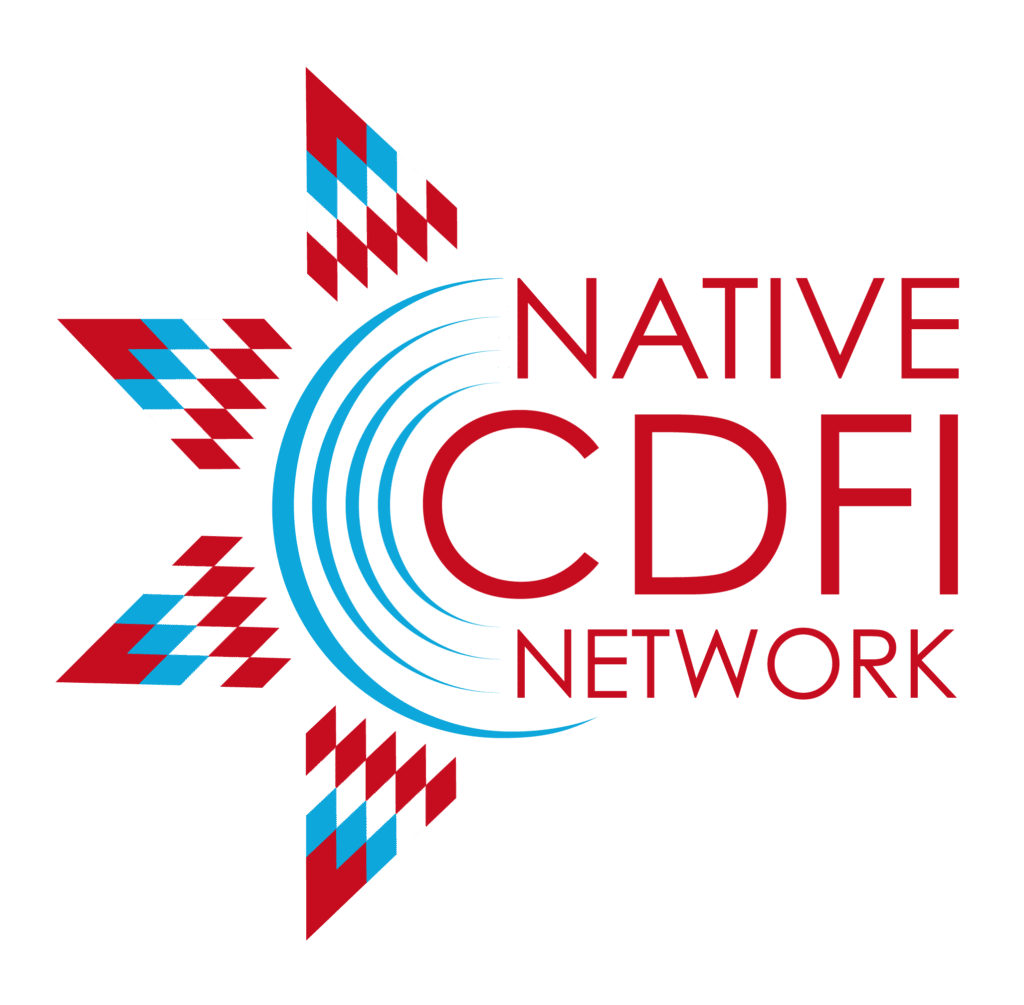
OMAHA, Nebraska – The Native CDFI Network (NCN) hosted its inaugural Clean Communities Investment Accelerator (CCIA) rollout event on October 10-11, 2024, in Omaha. As one of five recipients of the U.S. Environmental Protection Agency’s (EPA) Clean Communities Investment Accelerator Awards, NCN was awarded $400 million, marking a historic investment in clean energy initiatives for Native communities. This event brought together 63 Native CDFI CCIA Community Lenders from across Indian Country to provide a comprehensive overview of the program, its objectives, and the critical role Native CDFIs will play in advancing clean energy development for tribal communities.
Testimonials from Participants
“The Native CDFI Network outdid themselves with the CCIA Community Lender gathering in Omaha, bringing together innovators, experts, and resources in the clean energy field. With these tools, we will witness tremendous energy innovation throughout Indian Country using local and human values to increase the economy of tribal communities in the clean energy sector.”
– Angie Main, Executive Director of NACDC Financial Services
“First, I was a bit stressed coming into the NCN CCIA conference, however that apprehension was quickly replaced by calm. I was pleasantly surprised by the depth and highly professional manner in which NCN presented their researched details. The blend of speakers, along with factual data, and informed, yet still approachable, staff and contractors was top- notch. NCN incorporated the needs of Native CDFIs into the way the information was presented. To think that five or so years ago we hoped to provide Capacity Building training to complement the advocacy and policy work at the first Summit. Fast forward to now, NCN is providing relevant tools and training at the top of our CDFI industry. Keep up the good work!”
– Christopher Coburn, CEO of PBM- Place to Borrow Money
“The Native CDFI Network inaugural convening with its designated 60+ Community Lenders was extraordinary. Every component that a small or large Native CDFI will need had a place on the 2-day agenda in Omaha. The handouts to move toward a grant agreement with NCN were excellent, as well as the panel discussions with industry professionals, Tribal Leaders, and access to the EPA officials working closely with NCN.”
– Robin Puanani Danner, Board Chair of Oweesta Corporation and CEO of TiLeaf Group.
“The NCN Team did an amazing job convening us in preparation for our GGRF CCIA applications. The content about the requirements for a successful application was detailed and thorough. I feel like I have been given all the tools to prepare a good application. I also really enjoyed the presentations from groups already engaged in climate lending. There was great information that inspired me and gave me more perspective on this emerging field. This is exactly the type of offering we need to build our skills as climate lenders. Well done, Native CDFI Network!”
– Kim Pate, Managing Director of NDN Fund
“The Native CDFI Network’s CCIA Community Lender Convening provided the Alaska Growth Capital team with the knowledge and resources to confidently return home to deploy funding into clean energy projects in our market. From preparing the lender handbook, to gathering clean energy practitioners and experts across various relevant fields, the NCN team did an excellent job. While we understand that this is a new initiative and questions will undoubtedly arise, Alaska Growth Capital knows that NCN will be there with us – advocating and supporting us – ever step of the way. Thank you, NCN!”
– Mary Miner, Vice President of Community Development at Alaska Growth Capital
Welcome Message by NCN CEO Pete Upton
NCN CEO Pete Upton emphasized the significance of the CCIA award in positioning Native communities at the forefront of the clean energy transition to combat climate change, supported by NCN’s CCIA Community Lenders. “This convening is a critical first step in our journey to ensure Native CDFIs are equipped to lead their communities in developing sustainable, clean energy projects that both honor our lands and provide economic growth,” Upton said. He stressed that NCN’s primary focus is on Native CDFIs, reinforcing their importance as the backbone of Native community-driven development. Upton expressed gratitude to the 63 Native CCIA Community Lenders for their collaboration, which helped secure the $400 million award, showcasing the power of unity in Indian Country to ensure fair access to climate-related funding.
The Greenhouse Gas Reduction Fund and the Role of Native CDFIs in Achieving Clean Energy Goals
Aileen Nowlan, Division Director at the EPA, provided a welcome message commending NCN’s leadership in clean energy financing. She emphasized the EPA’s continued commitment to supporting Native communities in their pursuit of energy equity and provided an overview of the Greenhouse Gas Reduction Fund (GGRF) program, which advances clean energy solutions.
Ho-Chunk Inc.’s Clean Energy Development as Economic Cornerstone
Keynote speaker Lance Morgan, President and CEO of Ho-Chunk, Inc., shared insights into the economic success of the tribe’s economic development corporation, including their solar projects in Ho-Chunk Village. Since launching Ho-Chunk, Inc. in 1994, Morgan has driven economic development initiatives that have earned national recognition. He discussed how their clean energy projects have created jobs, strengthened the tribe’s economic sovereignty, and provided a model for other tribes to follow.
A Vision of Clean Energy Development
Timothy Rhodd, tribal chairman of the Iowa Tribe of Kansas and Nebraska, captivated attendees with a powerful story about his tribe’s clean energy journey. Guided by the goals of economic self-sufficiency and environmental stewardship, Chairman Rhodd emphasized, “Our pursuit of clean energy is not just about financial independence—it’s about protecting our lands for future generations while creating opportunities for our people today.” Chairman Rhodd candidly discussed the challenges his tribe has faced, including regulatory hurdles and the need for technical assistance. He expressed optimism about the future, noting that each challenge presents an opportunity for growth and innovation.
The Role of Native CDFIs in Clean Energy Financing
David Tam, CEO of Grey Snow Management Solutions LLC, a corporation wholly owned by the Iowa Tribe of Kansas and Nebraska, and Artees Vannett, Director of Operations, highlighted the crucial role Native CDFIs play in financing clean energy projects. They discussed how Native CDFIs provide critical capital for feasibility studies, pre-development, construction, and equipment purchases, helping reduce the financial risks tribes face. Their presentation emphasized the unique impact Native CDFIs have in addressing the needs of tribal communities.
Braiding Resources to Support Clean Energy Projects in Native Communities
Pilar Thomas, Partner at Quarles & Brady, offered an insightful presentation outlining key priority projects within the CCIA program, along with an array of available grants, tax rebates, and other financial tools that tribes can access to advance their clean energy efforts. Throughout the two-day convening, attendees had multiple opportunities to connect with Thomas, discussing in greater detail the various funding streams and resources available to expand upon the capital provided by the CCIA award. Thomas emphasized the importance of strategically leveraging these programs, especially those designed to support Low-Income and Disadvantaged Communities (LIDAC) in Indian Country. She highlighted how these additional funding sources could be braided together to maximize the impact of clean energy projects, helping tribal communities overcome common financial barriers and ensuring long-term project sustainability. Attendees left the event with a deeper understanding of how to tap into these financial opportunities, expanding their capacity to deploy clean energy solutions across Indian Country.
NCN CCIA Team Introductions and NCN CCIA Handbook Overview
Kristen Wagner, NCN National Program Director; Shauntel Hogan, NCN National Communications Director; Pamela Boivin, NCN CCIA Program Manager; and Jodi Fisher and Luke Robinson, NCN CCIA Regional Coordinators, were introduced as the team presented the NCN CCIA Handbook, a comprehensive guide designed to support Native CDFI CCIA community lenders throughout the deployment process. The handbook was well-received, praised for its practicality and thoroughness. Upton added, “I am very proud of the staff for working diligently over the last several months to produce such a quality resource for Native CDFI CCIA Community Lenders.”
Collaboration for Success
Michael Swack, University of New Hampshire’s Carsey School of Public Policy, discussed how Native CDFIs can expand their lending portfolios to include clean energy loans. He highlighted the importance of collaboration between tribal governments, Native CDFIs, and technical experts to navigate regulatory challenges and unlock federal funding opportunities. Part of the panel discussion led by Swack included Cindy Logsdon, Executive Director of Citizens Potawatomi CDC; Rollin Wood, Executive Director of Native Partnership for Housing; and Pamela Boivin, CCIA Program Manger at NCN and former Executive Director of Woodland Financial Partners. Together, they emphasized the critical role that partnerships and collaboration play in advancing clean energy projects in Indian Country, ensuring that Native CDFIs have the tools and support needed for success. Boivin emphasized the successful collaboration between Native CDFIs in Wisconsin, highlighting the importance of mutual support throughout the CCIA journey. Collaboration emerged as a central theme, underscoring the critical partnerships necessary for clean energy project success.
Successful Native Community Energy Projects
Matthew Marshall, Director of Energy Resilience and Business Development at Blue Lake Rancheria, shared strategies for engaging tribal leaders and community members in clean energy initiatives. He highlighted the importance of long-term planning for energy resilience and provided real-time examples of how Blue Lake’s proactive measures in addressing community energy challenges, such as fires and earthquakes, have been transformative for the Northern California rural tribe.
The Blue Lake Rancheria Tribe has been a leader in climate action since 2008, with a strong commitment to reducing energy consumption and achieving zero greenhouse gas emissions by 2030. In addition to the microgrid, the tribe has completed numerous energy efficiency upgrades and invested in renewable energy for transportation, residential, and municipal purposes. They have also embraced green transportation by installing electric vehicle charging infrastructure and building a biodiesel manufacturing plant. These efforts have led to a 40% reduction in energy consumption since 2014. Through partnerships with local, state, and federal agencies, including the Schatz Energy Research Center at Humboldt State University, Blue Lake Rancheria has lowered energy costs, created new jobs, and contributed significantly to CO2e reductions, positioning the tribe as a national leader in sustainable energy practices.
Marketing & Communications – CCIA Media Kit
Brian Edwards, Associate Editor of Tribal Business News, led a discussion on marketing and communications concerns and needs. Upton emphasized that NCN is taking an inclusive approach, asking the NCN CCIA community lenders to guide the organization’s strategies rather than adopting a “build it and they will come” approach. A real-time interactive poll allowed attendees to share their concerns and needs, providing insights into the specific support required to effectively promote clean energy initiatives.
Supply Chain and Boots on the Ground
Scott Williams of Greentech Renewables discussed the project development process, the touchpoints where financing is needed, and the journey of developing successful partnerships to complete clean energy projects. He also showcased cost-effective solutions for end-users through solar and clean energy projects, explaining how energy audits can benefit homeowners, business owners, vendors, and capital providers. Adam Herink, of Afton Energy, joined the discussion, bringing additional insights into design services and energy development projects. Herink shared the challenges and successes of solar projects on the Winnebago Reservation in Thurston County, Nebraska, stressing the importance of a community energy plan. Upton expressed plans to continue conversations with Greentech Renewables and Afton Energy. During lunch, solar panels and equipment were displayed for hands-on demonstrations and discussions.
Closing Remarks by NCN CEO Pete Upton
As the Native CDFI Network’s official launch of the Clean Communities Investment Accelerator (CCIA) convening concluded with closing remarks by Pete Upton, the event left a lasting impression of collaboration and dedication. Over the course of two days, participants engaged in insightful discussions, accessed invaluable resources, and built strong connections that will support clean energy initiatives and strengthen the economic resilience of Native communities. The shared tools, knowledge, and collective spirit fostered during the event have laid the groundwork for Native CDFIs to spearhead the clean energy transformation throughout Indian Country.
This historic $400 million investment through the CCIA is a once-in-a-lifetime opportunity for Indian Country, underscoring the trust and confidence placed in Native CDFIs. It highlights their pivotal role in driving both clean energy progress and economic growth for tribal communities. The Native CDFI Network is proud to lead this transformative effort, as the potential for long-term growth and development in Indian Country becomes increasingly clear. The path to a sustainable and prosperous future for Native communities has only just begun, and the positive impact of this investment will resonate for generations to come.
Looking Forward
The Native CDFI Network’s CCIA convening in Omaha marked a significant milestone in the clean energy movement for Native communities. As the journey continues, Native CDFIs will remain at the forefront, driving economic growth and environmental stewardship across Indian Country. The next in-person convening will be in Washington, DC, from December 11-13, 2024, at the 5th Annual Native CDFI Network Policy and Capacity Building Summit at the Hyatt Regency Hotel on Capitol Hill. A special event will take place on the afternoon of December 12th at the National Museum of the American Indian.
Thank You to Our Supporters

For more information, please contact:
Shauntel Hogan, National Communications Director, Native CDFI Network
[email protected]
(308) 390-3315
About the Native CDFI Network:
The Native CDFI Network provides support, advocacy, and resources to Native Community Development Financial Institutions (CDFIs) that serve tribal communities across the United States. By working to increase capital access and build economic self-sufficiency in Indian Country, NCN plays a vital role in advancing sustainable economic development for Native communities. In 2024, NCN was awarded the Greenhouse Gas Reduction Fund’s Clean Communities Investment Accelerator (CCIA), a $400 million grant, further solidifying its commitment to driving clean energy projects and fostering economic resilience across Indian Country.

